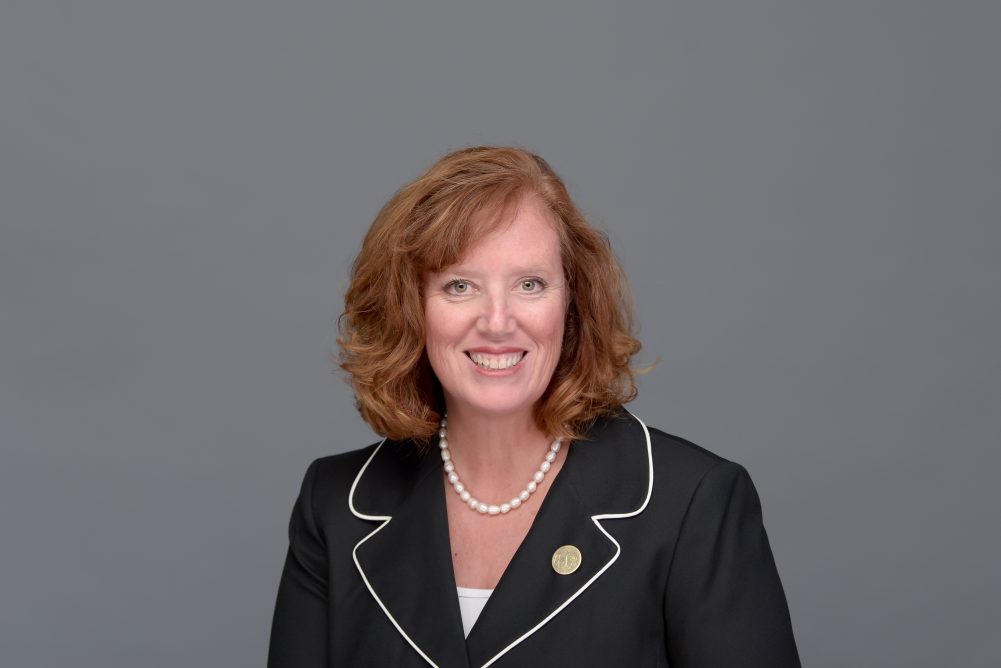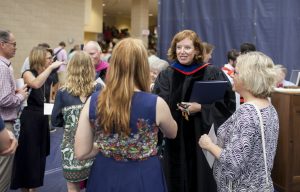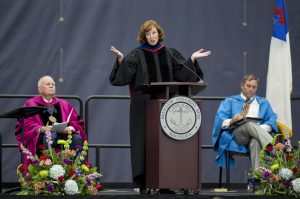 As provost, I think about academic affairs at Hope College every single day. I focus on our students’ education and experience. I spend most of my days meeting with faculty, staff, and students asking questions and listening for what’s going well and what can be improved.
As provost, I think about academic affairs at Hope College every single day. I focus on our students’ education and experience. I spend most of my days meeting with faculty, staff, and students asking questions and listening for what’s going well and what can be improved.
Here’s what I know so far. We have 235 full-time faculty who are well-educated, well-equipped scholarly teachers. I appreciate that at Hope College, full-time faculty teach the vast majority of our courses. Unlike our competitors, we don’t have many part-time instructors—and when we do, they’re practitioners in their field who add to the quality of our education here. And at Hope, we have zero graduate teaching assistants—unlike large land grant research institutions. In short, the vast majority of our professors hold the top degree—PhDs in their fields–and they hold leadership roles in their professional associations and are national experts and authors in their fields. I appreciate the fact that our faculty’s full-time careers are to teach well, conduct research, mentor students, and work closely with students in countless ways. And the faculty are caring and very student-centered—they love to work with students. Students are the highlight of our collective work.
So, I think we get it right—after 21 years of academic leadership experience and having seen various models, I believe it’s best to have a hybrid model of teaching really well and doing research. Some schools teach a lot but don’t do much research or stay on top of their fields. Other institutions do research and teach a little—to varying degrees of success, quality and engagement. We do both and we do them well.
 I’ve also spent a good amount of time meeting with and listening to our students, individually and in groups. Our students’ stories and lived experiences are impressive here. I appreciate all that they’re able to juggle here at Hope. Many are double majors–bringing together interesting combinations of study like Engineering and Dance, Computer Science and Classics, Communication and Religion, Neuroscience and Art, the list goes on. I’ve learned to listen for the “and”—they study this AND that. Students can do that here at Hope; students cannot do so everywhere.
I’ve also spent a good amount of time meeting with and listening to our students, individually and in groups. Our students’ stories and lived experiences are impressive here. I appreciate all that they’re able to juggle here at Hope. Many are double majors–bringing together interesting combinations of study like Engineering and Dance, Computer Science and Classics, Communication and Religion, Neuroscience and Art, the list goes on. I’ve learned to listen for the “and”—they study this AND that. Students can do that here at Hope; students cannot do so everywhere.
And then I like to ask students what else they do with their time here. Many engage in interdisciplinary projects. Hundreds of students conduct collaborative undergraduate research with our faculty members. Many are involved in the National Science Foundation-funded research projects. Students present and publish their research with our faculty—in many institutions, this is unheard of at the undergraduate level. I know many places will use the student labor and intellectual contributions but not give them credit. Hope College shares the research opportunity and the authorship with our students. To give you a sense of our undergraduate research prowess at Hope College, the Council for Undergraduate research awarded us along with two other institutions in the nation for our high level and high quality of undergraduate research. And our students earn major international awards and recognitions for their excellence through prestigious awards like Lilly, Goldwater, Mellon, Fulbright, and more. Having served as a founding graduate program director elsewhere, I’ve concluded that our undergraduate education is a whole lot like graduate education elsewhere in the depth, quality, and research experiences that our students have alongside our talented faculty. We’re providing rich, robust, and rigorous academic experiences for our students.
 In addition, our students tell me that they are athletes, musicians, dancers or artists. And most students are leaders and community servants who care about things that are bigger than themselves. Our student body is full of smart and ambitious, but other-centered individuals. It is the well-rounded and the holistic approach to their education and their lives that I love the most.
In addition, our students tell me that they are athletes, musicians, dancers or artists. And most students are leaders and community servants who care about things that are bigger than themselves. Our student body is full of smart and ambitious, but other-centered individuals. It is the well-rounded and the holistic approach to their education and their lives that I love the most.
And let me tell you about a Hope College student I know particularly well, my son. This year, our oldest child started college at Hope College. He chose Hope for the superb science programs, to have the opportunity to play Division III lacrosse, to engage in a wide array of study abroad and undergraduate research opportunities, and because of the vibrant chapel program. I can tell you that wearing my two hats of provost and mom in one place have thrilled me. Hearing our son talk about how much he loves his classes, the faculty, the Phelps Scholars program, lacrosse, residential experience, and his new friends makes my heart sing. After a 21 year career in higher education, where I have truly loved academics and have seen its power daily in everyone else’s children, I now have the opportunity to watch my child (whom I love deeply) love what I love. And it’s ridiculously good!
So, I’m delighted to lead at Hope College.
A place that celebrates a well-rounded education, holistic student experience, and a relational endeavor that weds academics and faith in a safe and idyllic playground on the shores of Lake Michigan where gorgeous sunrises and sunsets fascinate us each day! This is all distinctly Hope College and I’m genuinely pleased to travel this academic, relational, and spiritual path with your child and student. Know that I’m as invested in your child’s education as my own son’s four years here.
Grace and peace to all of you, friends!
Cady Short-Thompson, PhD
Provost, Hope College

